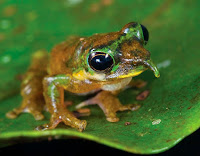 |
| Litoria pinocchio
Oliver, Günther, Mumpuni & Richards, 2019
|
Abstract
A small number of treefrog species (Litoria) from Melanesia are unusual amongst Anura in having distinctive fleshy rostral spikes. Here, we first present an extended description for Litoria pronimia Menzies, a small species that is widespread along the southern edge of the Central Cordillera of New Guinea, and in which males have a long and erectile rostral spike. Second, we describe Litoria pinocchio sp. nov. a new, morphologically similar, yet geographically disjunct species from the Foja Mountains in northern Papua Province, Indonesia. The new species differs from Litoria pronimia in aspects of body shape, proportions and colouration. A review of variation in the size, structure and degree of sexual dimorphism of the rostral spike across different species of Litoria suggests varying function including mate selection and camouflage.
Keywords: Amphibia, Frog, Indonesia, mate selection, rostral ornamentation, sexual dimorphism
 |
| Litoria pinocchio sp. nov. holotype (MZB amph.15094) in life; lateral view with spike fully erected.
Photograph: Tim Laman.
|
Litoria pinocchio sp. nov.
Northern Pinocchio Treefrog
Etymology. In reference to Carlo Collodi’s fictional character Pinocchio, who had a nose that became longer when under stress or lying.
 |
| Litoria pinocchio sp. nov. holotype (MZB amph.15094) in life.
Photograph: Tim Laman.
|
Paul M. Oliver, Rainer Günther, Mumpuni Mumpuni and Stephen J. Richards. 2019. Systematics of New Guinea Treefrogs (Litoria: Pelodryadidae) with Erectile Rostral Spikes: An Extended Description of Litoria pronimia and A New Species from the Foja Mountains. Zootaxa. 4604(2); 335-348. DOI: 10.11646/zootaxa.4604.2.6
Frog discoveries have scientists hopping app.secure.Griffith.edu.au/news/2019/06/07/frog-discoveries-have-scientists-hopping
twitter.com/AmphSpecWorld/status/1128397639676985344
New Pinocchio frog species has a strange, pointy nose on.natgeo.com/2EXB9rP @NatGeo
New Pinocchio frog species has a strange, pointy nose on.natgeo.com/2EXB9rP @NatGeo



